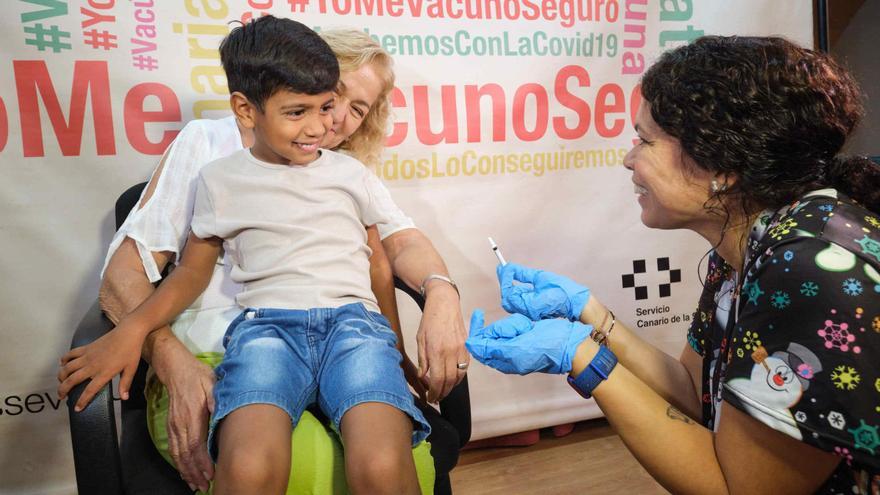The Ministry of Health of the Government of the Canary Islands, through the General Directorate of Public Health, will start on Monday, October 16, all health centers of the Canary Islands Health Service (SCS). Vaccination campaigns against influenza and covid-19 The 2023-24 season includes a host of new features compared to previous seasons.
related
Canary Islands ready for 2023-24 flu season 335,000 vaccine doses total, with a total investment of 2,989,000 euros. By vaccinating high-risk groups against both influenza and Covid-19, we can avoid having both infections coexisting in the same person, minimizing the severity of illness in patients and the strain on the health system.
The ministry insistedThe vaccine is the most effective way to avoid getting or spreading the flu, Particularly those who are at risk of complications from the disease and those who are vital to the community, such as health workers and caregivers of older people or dependents.
Facing this season, there will be The four vaccines are designed to:
- Target group over 6 months old. 100,000 doses have been purchased, with an investment of 390,000 euros.
- Target group over 24 months. 180,000 doses of vaccine have been purchased for a total amount of 1,386,000 euros.
- Housing the elderly and bedridden elderly population at home; Over 60 years old. 30,000 doses of vaccine have been purchased, with an investment of 750,000 euros.
- Boys and girls aged two to five (59 months) No underlying pathology. It may also be used in patients aged between five and fourteen years (inclusive) with underlying pathology and without contraindications. 25,000 doses of vaccine have been purchased, with an investment of 463,000 euros.
Influenza and COVID-19 vaccinations will start on Monday, October 16, with 335,000 doses for the Canary Islands
suggestion
every year, rInfluenza vaccination recommendations for autumn and winter For those who are at higher risk for complications from infection and who may spread the disease to other people who are at higher risk for complications. As of the 2021-2022 season, flu vaccinations are available at the same time as Covid-19 vaccinations.
The purpose of getting a coronavirus vaccine is to Strengthen protection for the most vulnerable and the efforts of health and social care personnel to reduce morbidity and mortality caused by the SARS-CoV-2 virus and the impact of the disease on health and social care capacity.
Taking into account the current epidemiological situation of covid-19, Vaccination recommended Fall and winter (2023-2024) are for:
Because you have a greater risk of complications or serious illness if you have these infections:
-
Persons 60 years of age or older.
-
Persons five years of age or older, inmates of care centers and nursing homes for persons with disabilities, and other long-term institutionalized persons and residents of closed institutions.
-
People under 60 with chronic medical conditions, such as:
-
Diabetes and Cushing’s syndrome.
-
Morbid obesity (BMI ≥40 in adults, ≥35 in adolescents, or ≥3SD in children).
-
Chronic cardiovascular, neurological, or respiratory diseases, including bronchopulmonary dysplasia, cystic fibrosis, and asthma.
-
Chronic kidney disease and nephrotic syndrome.
-
Hemoglobinopathies and anemia or hemophilia, other coagulation disorders and chronic bleeding disorders, and recipients of blood products and multiple transfusions.
-
Asplenia or severe splenic dysfunction.
-
Chronic liver disease, including chronic alcoholism.
-
Severe neuromuscular disease.
-
Immunosuppressive.
-
Cancer and hematological malignancies.
-
Cerebrospinal fluid fistula and cochlear implant should wait.
-
Celiac disease.
-
Chronic inflammatory diseases.
-
Disorders and diseases that cause cognitive impairment: Down syndrome, dementia, etc.
-
Pregnant women in any trimester of pregnancy and women in the postpartum period (six months after giving birth).
-
Living with highly immunosuppressed people, people with other high-risk medical conditions, and the elderly.
To reduce the impact and maintenance of critical and essential services to the community:
-
Staff from health centers and institutions (including pharmacies) and public and private social and health care providers (health and non-health staff).
-
Personnel engaged in basic public services should pay special attention to the following groups:
-
National, regional and local security forces and agencies.
-
Armed Forces.
-
Firemen.
-
Civil Protective Services.
Flu vaccination
In addition to the previous groups, influenza vaccination is also recommended for the following groups:
-
Population of children aged 6 to 59 months (5 years).
-
People between the ages of 5 and 59 who are at higher risk of influenza complications, such as those between the ages of 5 and 18 who are receiving long-term acetylsalicylic acid treatment, or all smokers.
-
Students undertake internships in health centers and institutions (including pharmacies) and social health centres.
-
Persons who have direct occupational contact with poultry, pig or mink farms or animals or their secretions or wild fauna (birds, wild boar or mustelids), such as ranchers, veterinarians, farm workers, hunters, ornithologists The purpose of vaccinating these groups is to reduce the chance of simultaneous infection of humans and avian or swine viruses, thus reducing the possibility of recombination or genetic exchange between the two viruses.

